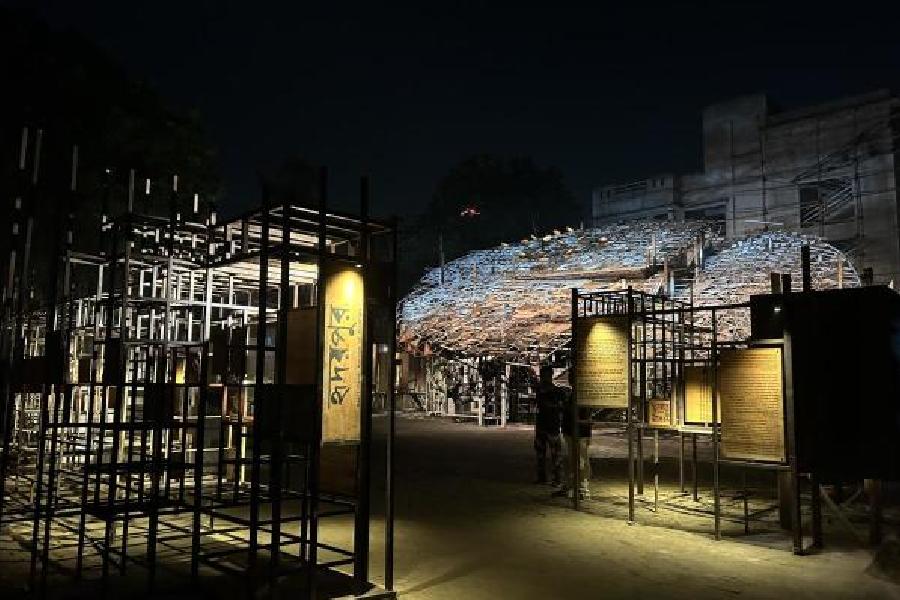Lighting in pandals is no longer about illumination. It is about how much you want to reveal or what you want to highlight,” says Animesh Mondal, a light designer who has been doing the lights for puja pandals for over a decade. In his spare time, he makes documentary films.
“But this is not a very recent trend. It began when theme pandals started coming up in the late 1990s,” says Sudip Sanyal, who too calls himself a light designer. He has been executing stage lighting and has created sound and light shows too.
Dipankar Dey had also been arranging stage lighting for the last two decades, when this trend started. Suddenly, he found that his experience as a theatre light designer was much sought after. He tells The Telegraph, “Light arrangement is not about fixing a light here, some LEDs there and floodlights elsewhere. We have to do a lot of research about the theme on which the pandal is based. We have to analyse the time and the mood we need to create. And, above everything we have to keep the joyful spirit of the festival alive. I have to do a lot of brainstorming if I have to get everything aligned.”
Ashis Saha, whose chief job description is film director, says, “As a light designer, my job is to narrate the theme of the puja with the help of lights.”
Till some years ago, puja lighting meant Chandernagore. Most versions say Sridhar Das of Chandernagore pioneered innovative lighting in the mid-20th century. Das used to make giant installations with lights and also delineate human figures and faces. He could create dinosaurs, elephants, crocodiles… the puja committee’s wish was his command. Later, he also created light installations that portrayed sparklers, spinning wheels and other fireworks. It is said he even set up light decorations underwater. In 2003, he created a seven-foot-long peacock boat for the Thames Festival in London using 1,30,000 tuni bulbs — miniature 6.2 volt bulbs.
This work fetched Chandernagore global acclaim.
“The difference between theme lighting and the lighting synonymous with Chandernagore is that the latter is all about illumination,” says Sanyal. He continues, “Coloured lights were created — yellow, crimson, azure and green — using cellophane paper to cover the bulbs. They lit up an area. But the task of the light designers was to create a shadow while illuminating an object. The arrangement had to be such that it would help narrate the theme of the puja pandal. We have to know where or what to focus the light on and where not to.”
Dipankar Dey agrees. He uses his years of experience designing sets for theatre and cinema to create lighting for pandals. He says, “When I am making a film, I zoom in on my subject so that people know who I am talking about. But when working on the stage, I do not have a lens with which I can zoom in. All I have is a spotlight. My light will follow the subject and leave the background in darkness. That is called light arrangement.”
In 2022, he designed the lighting for Naktala pandal. Artist Pradip Das’s Mota Kapor theme here was based on the struggles of refugees from East Pakistan in 1947. Dey says, “I had kept the lights low to suit the sombre theme. I used a combination of warm light and cool light to break the monotony, the greyness.”
Sanyal adds, “Through our designs, we highlight only what we want to show our spectators. The source of the light is not visible. I mean you cannot see the bulb. You can only see the glow. Light takes a back seat.” Sanyal designed the son et lumiere in 2007 for a pandal in Kasba.
Pradip Das has been closely working with light designers this year as well. He says, “A theme pandal is a collaboration between the artist and the light designer. I share the theme with the light designers at the very onset. They need at least a month or two.” He adds, “I can create a space, a pandal but illuminating it artistically and intelligently lends another dimension to the story I have imagined.”











